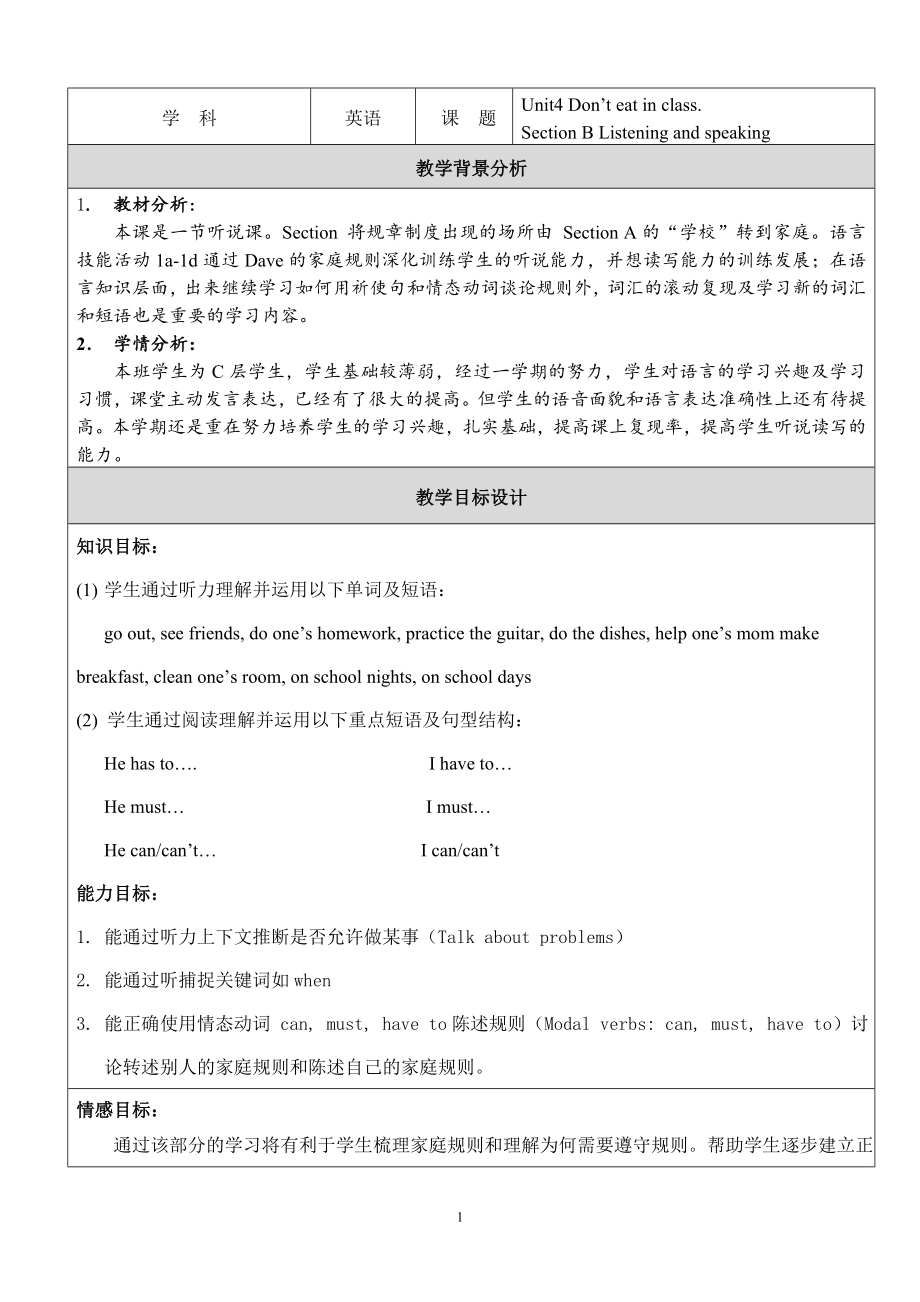《人教版英語七年級(jí)下冊(cè)Unit 4 Don't eat in class.Section B 1a-1d表格式教案》由會(huì)員分享�����,可在線閱讀�,更多相關(guān)《人教版英語七年級(jí)下冊(cè)Unit 4 Don't eat in class.Section B 1a-1d表格式教案(3頁珍藏版)》請(qǐng)?jiān)谘b配圖網(wǎng)上搜索。
1�����、
學(xué) 科
英語
課 題
Unit4 Don’t eat in class.
Section B Listening and speaking
教學(xué)背景分析
1. 教材分析:
本課是一節(jié)聽說課�。Section 將規(guī)章制度出現(xiàn)的場(chǎng)所由 Section A的“學(xué)校”轉(zhuǎn)到家庭�����。語言技能活動(dòng)1a-1d通過Dave的家庭規(guī)則深化訓(xùn)練學(xué)生的聽說能力��,并想讀寫能力的訓(xùn)練發(fā)展�;在語言知識(shí)層面,出來繼續(xù)學(xué)習(xí)如何用祈使句和情態(tài)動(dòng)詞談?wù)撘?guī)則外����,詞匯的滾動(dòng)復(fù)現(xiàn)及學(xué)習(xí)新的詞匯和短語也是重要的學(xué)習(xí)內(nèi)容。
2. 學(xué)情分析:
本班學(xué)生為C層學(xué)生�����,學(xué)生基礎(chǔ)較薄弱����,經(jīng)過一學(xué)期的努力,學(xué)生對(duì)語言的學(xué)習(xí)興趣及
2����、學(xué)習(xí)習(xí)慣,課堂主動(dòng)發(fā)言表達(dá)�,已經(jīng)有了很大的提高。但學(xué)生的語音面貌和語言表達(dá)準(zhǔn)確性上還有待提高�����。本學(xué)期還是重在努力培養(yǎng)學(xué)生的學(xué)習(xí)興趣,扎實(shí)基礎(chǔ)����,提高課上復(fù)現(xiàn)率,提高學(xué)生聽說讀寫的能力���。
教學(xué)目標(biāo)設(shè)計(jì)
知識(shí)目標(biāo):
(1) 學(xué)生通過聽力理解并運(yùn)用以下單詞及短語:
go out, see friends, do one’s homework, practice the guitar, do the dishes, help one’s mom make breakfast, clean one’s room, on school nights, on school days
(2) 學(xué)生通
3����、過閱讀理解并運(yùn)用以下重點(diǎn)短語及句型結(jié)構(gòu):
He has to…. I have to…
He must… I must…
He can/can’t… I can/can’t
能力目標(biāo):
1. 能通過聽力上下文推斷是否允許做某事(Talk about problems)
2. 能通過聽捕捉關(guān)鍵詞如when
3. 能正確使用情態(tài)動(dòng)詞 can, must, have to陳述規(guī)則(Modal verbs: can, must, have to)討論
4��、轉(zhuǎn)述別人的家庭規(guī)則和陳述自己的家庭規(guī)則���。
情感目標(biāo):
通過該部分的學(xué)習(xí)將有利于學(xué)生梳理家庭規(guī)則和理解為何需要遵守規(guī)則�����。幫助學(xué)生逐步建立正確����、積極的生活態(tài)度和價(jià)值觀
教學(xué)重、難點(diǎn)
教學(xué)重難點(diǎn):
運(yùn)用所學(xué)詞匯和句型轉(zhuǎn)述別人的家庭規(guī)則
運(yùn)用所學(xué)詞匯和句型陳述自己的家庭規(guī)則
教學(xué)方法: 頭腦風(fēng)暴��、小組合作
教學(xué)資源: 教材�����、多媒體��、課件
教學(xué)過程
教學(xué)環(huán)節(jié)
教 師 活 動(dòng)
學(xué) 生 活 動(dòng)
設(shè) 計(jì) 意 圖
1. Lead-in:
Have students recall what they learn in Section A
ü What can we
5�����、do at school? What can’t we do?
ü What do we have to do? What’s the matter with the girl?(show ss pictures)
Have students talk about their family rules briefly
ü Talk about school rules by using the sentence patter in Section A
ü Think and discuss family rules briefly.
提出問題引發(fā)學(xué)生思考
自然導(dǎo)入新課
激
6�����、發(fā)學(xué)生興趣
進(jìn)行部分問題的引導(dǎo)
2. Pre-listening1
1a
Look at the picture and guess what rules Dave has.
Look at the picture and read the rules in the chart and guess what rules Dave has.
通過聽力預(yù)測(cè)掃清聽力障礙
3. While-listening
Listen and check what things Dave can do and can’t do
Ex. 1b
Listen and check
培養(yǎng)
7����、學(xué)生有目的的聽
抓住聽力主旨大意
2nd Listening
1c
Listen and write down when Dave has to follow the rules
Ex.1c
Listen and write
培養(yǎng)學(xué)生抓住聽力關(guān)鍵詞
4. Post Listening 1
Listen and read
Listen and read
通過跟讀�����,模仿�����,訓(xùn)練良好語音語調(diào)
5. Speaking 1
Talk about the rules in Dave’s house
Talk about the rules in Dave’s house
He
8、 has to…/must…
半控制合作活動(dòng)
進(jìn)行口語輸出
6. Speaking 2
Have students work in groups and talk about their family rules and write it down on the big piece of paper
ü Think
ü Discuss in the group
ü Write down on a piece of paper
ü Present in groups
利用所學(xué)詞匯和句型進(jìn)行口語輸出
7. Homework
1.背單詞�����、短語及句型��,熟讀聽力
9���、文本�。
2.完成學(xué)案練習(xí)�。
板書設(shè)計(jì)
Unit4 Don’t eat in class?
Section B 1a-1d
can’t/can
must/musn’t
have to has to
school rules
rules
when
family rules
on school nights
on school days
after/before…
every
go out
see friends
do his homework
practice the guitar
do the dishes
help his mom make breakfast
clean his room
3
 人教版英語七年級(jí)下冊(cè)Unit 4 Don't eat in class.Section B 1a-1d表格式教案
人教版英語七年級(jí)下冊(cè)Unit 4 Don't eat in class.Section B 1a-1d表格式教案

